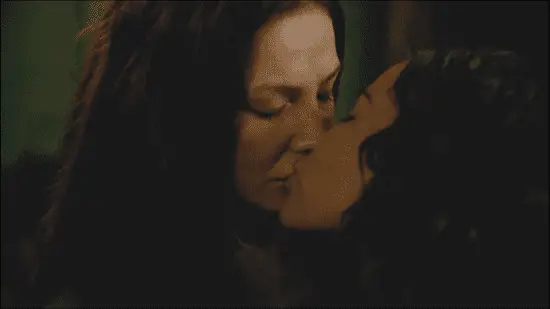Content Warning: This article discusses death, violence, torture, and attempted rape, as depicted on these shows. Full spoiler warning for all seasons of Black Sails and Into the Badlands.
A couple weeks back I explored the way in which Grimdark settings have a propensity to pile shitty experiences onto the innocent and noble characters in the narrative. One of the examples I used was Veil from Into the Badlands, a character whose suffering culminated in her death at the end of the most recent season. At the time I mentioned the desire to cover her death, and its implications, more in depth, so here I am, and here we are.
What makes Veil’s arc worth discussing in full is her intersectionality. She’s not just a female character, she’s also a woman of color and a mother. She’s also, as I pointed out in my discussion of the daemon ex machina, one of the nicest, most compassionate characters in a dark, dystopian setting and has the strongest moral compass of anyone on Into the Badlands thus far. So, I thought to myself, what better way to bring out the complexities and implications of her narrative than to compare and contrast her with a another mother who may not share all the same intersections, but ended up dying just the same? And what better show to do that with than the Fandomentals’ favorite show about bisexual pirates and dutiful princesses who fight against slavery?
I’m talking, of course, about Eleanor Guthrie from Black Sails.
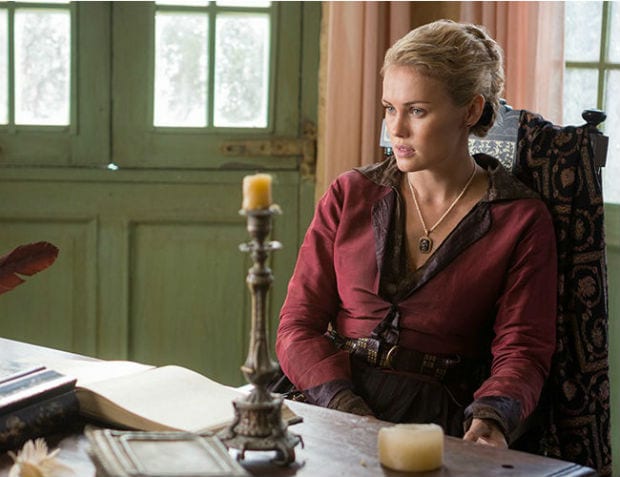
Watsonian Exploration: How Did it Come to This?
Other than both having functioning uteri, Eleanor and Veil share very little in the way of similar character or personality traits. Eleanor is basically everything Veil isn’t: ruthlessly pragmatic, ambitious, and calculating. She has a complicated relationship with her father, a stronger connection to places than to people, and will change sides on a dime if it benefits her goals. Eleanor thinks primarily in terms of ideological ends and how to get there, and will betray established relationships it if means achieving them.
While her goal for the first three seasons of Black Sails stayed the same—controlling and bringing ‘civilization’ to Nassau—the fourth season sees Eleanor shifting away from Nassau. Her marriage to Woodes Rogers and resulting pregnancy grants her a new perspective on what she wants and what will make her happy. It’s part of a larger pattern within the final season of the show contrasting the desire for ‘life with the one you love’ and ‘the fight for what’s right’. How different characters navigate this clash of ideologies determines their ending and relationships.
Eleanor is one of, if not the, first to choose life with the one she loves. She discovers early on in the season that she’s pregnant with Rogers’s child and begins to act based on her desire to settle down and have a life with him and the baby rather than bring war civilization to Nassau. Yet she does not want to tell him she’s pregnant, which leads to a seeming betrayal of him when she surrenders the fort to the pirates. She even goes so far as to fire on Rogers to get him to stay away in exchange for the Urca cache, and thus a new chance at life away from Nassau.
Believing Eleanor has returned to her ‘pirate ways’ and desperate to retake Nassau to find a way to pay off his debts, Rogers forms a tenuous alliance with the Spanish. The Spanish invade Nassau, and Eleanor must take cover in Mrs. Barlow’s abandoned house with Madi. When Flint and the others leave to chase down stray Spanish soldiers, one of the presumed dead soldiers outside the house attacks. He attempts to rape and/or kill both Eleanor and Madi, and in the ensuing fight, Madi is knocked out, Eleanor receives a wicked gash, and the house is set on fire. Madi eventually makes it out alive (hooray!), but Eleanor dies in Flint’s arms when he returns to check on them.
Eleanor’s death was both entirely unexpected and seemingly random. For many of us here at the Fandomentals who watched the show, it was and still is, the weakest point of the season. While it makes sense at one level because it’s hard to imagine where Eleanor fit into the finale the show was building toward, the suddenness of it was jarring. The show may ostensibly be about Flint and Silver, but Eleanor Guthrie has been, in my view, more of the secondary protagonist than even Silver was, especially in the first two seasons. I fully expected other female characters to die—Max and Anne, to be quite honest—but not Eleanor.
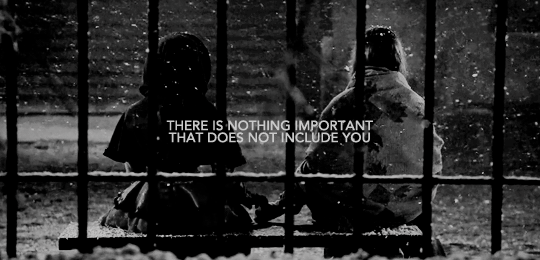
Thus, from a strictly Watsonian perspective, Eleanor’s death seems almost worse than Veil’s.
Now, before I discuss Veil’s story, I do want to mention that I actually really, really like Into the Badlands as a whole. Other than Veil’s arc, I find it to be a interesting, engaging, and enjoyable show to watch. It’s pretty violence, but it has an old-time kung-fu-esque vibe that prevents it from becoming overly gory or exploitative. There are also some pretty excellent primary female characters, one of whom is queer, and the main protagonist and romantic hero is an Asian man, Sunny. Media may be saturated with dystopian futures or alternate histories, but Into the Badlands offers a unique spin on the concept, and the worldbuilding is expansive and rich, even if it doesn’t stand up completely under close scrutiny.
Season 2 begins with Veil and her infant Henry all but prisoners of Quinn after she saved him from death at the end of S1. Her arc revolves around her attempting to escape the compound in which he holds her while simultaneously failing to treat his brain tumor but lying about it’s seeming progression toward remission. Finally, an escape attempt succeeds, and she seeks shelter with the Widow, who takes in refugees. However the Widow eventually trades her back to Quinn to negotiate an alliance against the other barons, whereupon Quinn forces her to marry him in order to make Veil’s and Sunny’s child his heir.
In the final, climactic battle of the season, Quinn holds her at knifepoint to force Sunny, the protagonist, to surrender baby Henry in exchange for Veil. (Quinn has kind of a creepy obsession with baby Henry, who isn’t even his kid, and it’s weird.) The standoff ends with Veil stabbing Quinn through her own body, killing both of them.
Rather than unexpected, Veil’s death was pretty well foreshadowed in hindsight. Veil also has a conversation with Tilda about how neither of them were willing to kill their abusers. Several times Veil and Baron Quinn discuss the fundamental difference in their characters; Quinn kills without compunction, Veil refused to kill even the man who brutally murdered her parents. Even on her wedding night as that same man attempts to rape her after forcibly marrying her, she struggles to follow through and actually kill him. The one time Veil killed someone was in self defense and, as it did not help her escape, it accomplished nothing. For Veil, killing others is not the answer and does not lead to freedom.
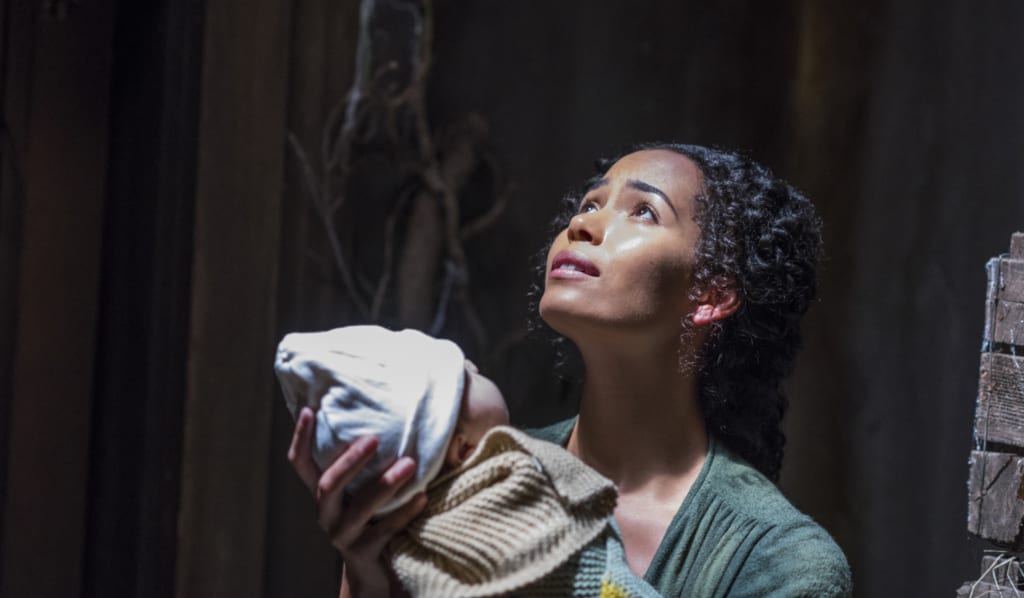
There were several false starts for her death, or at least violence against her, as well. Every time Veil attempted escape or to find some measure of agency in her imprisonment, I expected retribution that never came. Quinn’s building paranoia and thinning patience with Veil’s resistance to his predatory advances frayed to almost the breaking point several times. Quinn threatens baby Henry multiple times to induce Veil to help him. All season long there’s this bubbling tension regarding when Quinn’s finally going to snap and follow through on his threats toward Veil and Henry.
Unlike Eleanor’s story, Veil’s season-long build up is one of constant emotional and psychological suffering sprinkled with threats of violence both sexual and physical. The numerous conversations that highlight her inability to act violently unless under extreme duress, and even then only to protect the ones she loves, foreshadow her eventually being pushed to the point where she would willingly stab herself in order to also kill Quinn and thus protect her son and lover from a violent man. Within a strictly Watsonian exploration, then, at least Veil’s arc makes sense narratively-speaking and was pretty well foreshadowed.
Thematic Resonances: What Does it Mean In the Story?
Both characters fit within the parameters of the daemon ex machina I recently discussed. While not Grimdark or dystopian, the world of Black Sails is quite thoroughly violent and the historical period in which it exists, heavily tinged with sexism, racism, homophobia, and slavery. Eleanor may begin her character arc in S1 in the dark grey shade of moral ambiguity, but season 4 especially sees her attempting to grow beyond her violent past and reform her life.
Choosing love and family over Nassau has special thematic resonance for her given her relationship with her father. For young Eleanor, political and social ambition was a means to gain her father’s respect and approval. In fact, her desperate need for approval and ‘fuck the patriarchy’ resonated so much with me that for a long time, I really disliked her character development in S4. Ruthless, calculating, ambitious women who aren’t judged by the narrative for their choices are hard to come by. Like Claire Underwood, Eleanor Guthrie was a rare example of this character done extremely well.
The shift in character motivations from ‘political ambition’ to ‘settle down and be a wife and mom’ struck me at first glance as a cruel domestication of a powerful female character. All too often marriage and/or children are given to female characters as a way of ‘rounding out’ their happy ending, as if marriage and motherhood are the expected conclusions to a female protagonist’s journey. Doubly so if that female character has displayed independence, ambition, or cunning, traits that would make her more ‘conventionally masculine’ and therefore in need of ‘softening’ with domestic life. Gotta tame those independent-thinking women with babies and a man.
However, the more I think about the theme of the final season, the more I see how Eleanor’s story, while not perfectly executed, fits within that thematic arc. The conceptual struggle between a life of love and a fight for justice permeated the final season. Every primary character had to decide where their lines in the sand were and which ‘side’ of this ideological battle they would choose. Like Flint, Silver, and Madi, Eleanor chooses the person she loves.
Not only does it fit within the thematic whole, it’s a meaningful step for her character arc. That she willingly chooses not just family but to reject the city that represents her political aspirations and her father’s approval is the most significant step toward growth Eleanor Guthrie could possibly evince.
Nevertheless, unlike Flint, Silver, and Madi, Eleanor dies for her choice. She’s the only character who chooses love over the fight for justice who dies, and in a contrived and random manner. The only other primary character from S1 and still alive in S4 to not get a happy ending is Billy Bones, and he was going mad from his thirst for revenge. From a thematic perspective, I’m not quite certain what the takeaway is. Sometimes meaningful choices get you killed? The world is randomly violent?
Moreover, her pregnancy—coincidentally the aspect of her arc I find the least necessary and most exploitative—seems to shift her into the position that Veil has occupied from the beginning. Namely, that of the innocent who suffer most in a shitty world. By the end of Eleanor’s arc, she’s the innocent collateral damage; that she’s also the only one to specifically choose both wife-dom and motherhood prior to this, well…it’s not all that flattering.
Unlike Eleanor, Veil’s death at least has clear thematic resonance. Hers is the culmination of a resistance narrative and a noble sacrifice for her child. I suppose you could call Eleanor’s death a noble sacrifice. She is actively trying to save Madi from the blaze, and it’s a refreshing change to see a white character sacrifice themselves for a character of color rather than the other way around. Still, the suddenness of Eleanor’s death and the obvious levels of plot contrivance involved—that one soldier just happened to survive without anyone noticing or checking to see if he was really dead and then has the strength to overpower two women who are not at all unfamiliar with physical fighting or violence, sure Jan—kind of undermine the meaningfulness there.
And even if Veil’s death does have thematic resonance, it doesn’t actually follow that it’s positive thematic resonance. I’ll talk more about this in the implications sections below, but Veil’s death is the culmination of a season’s worth of suffering physical violence, constant threats, emotional and psychological torture, forced marriage to the man who killed her parents, and his attempted rape of her on their wedding night. She’s granted very little agency and is actively punished for any attempts to exert herself, culminating in her death.
It’s a resistance narrative for sure, but a rather shitty one in terms of the emotional impact on the audience. As Monique Jones put it in her review for Black Girl Nerds, she’s a damsel who doesn’t get rescued.
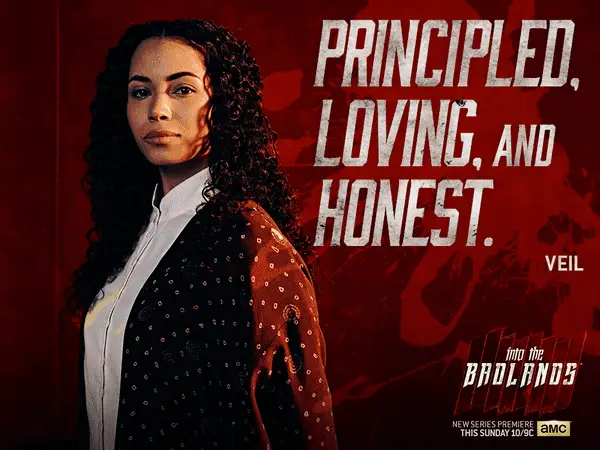
That’s not all, her story pretty clearly depicts domestic abuse after her forced wedding. Veil’s self-blame in the face of Quinn’s violent outburst; Quinn blaming her for being ‘drawn to men of violence.’ It’s not all that different from Quinn repeatedly telling Lydia she’s in love with him partly because of his dark nature. In fact, Veil’s reactions to Quinn after their marriage put a whole new spin on his relationship with Lydia. Suddenly, we see that this may not have been as mutual a relationship after all. Though it does not justify any of her choices, Lydia is likely just as much a victim of domestic abuse as Veil, especially in such a heavily patriarchal culture.
On the flip side, there’s some unfortunate messaging involved that wasn’t clearly teased out. Veil might not be attracted to Quinn, but Quinn is right that she’s drawn to one man of violence: Sunny. And while we, the audience, know Veil is not attracted to Quinn in any way, Lydia’s confirmation of Quinn’s comment that she loves him because of, not despite, his violence seems to endorse the idea that women are ‘asking for it’ when they get involved with violent and/or abusive men because they find those men attractive. To be clear, I don’t think the show, or the writers, intend this message at all. But it does stand out to me as an unfortunate takeaway based on the story they told with Lydia and Veil as domestic abuse victims.
So what’s the thematic value here? Domestic abuse kills women? Karma is especially bitchy if you’re a compassionate person in a Grimdark world? If you’re a nice person, everything sucks and then you die to save your baby? At least one of the showrunners clearly believes there’s power and thematic resonance to Veil’s sacrifice, but I’m having trouble seeing what it is other than that the one time she actually succeeds in exerting agency kills her.
Veil’s Noble Sacrifice™ also serves as a direct contrast to the metaphorical motherhood of the Widow. A former Baron’s wife turned Baron herself and champion of freeing the cogs from their enslavement, the Widow has no literal children of her own. However, her protégé Tilda calls her ‘mother’ as an honorific, and the show plays with the idea of her being a mother-figure to the cogs who seek shelter with her much like Dany is Mhysa to the slaves of Slavers Bay. (Though at least with the Widow there aren’t any White Savior implications, thank heavens.)
During the course of S2, however, the show systematically breaks this idealized picture of the Widow down while at the same time showcasing how far Veil will go to protect her baby. The Widow ultimately sacrifices Veil and others under her protection to save her female warriors/protégés, called Butterflies. Veil ultimately sacrifices herself to save Henry. While both put themselves in harms way to protect their children, metaphorical or biological, Veil was willing to die for her son. The Widow, on the other hand, betrayed Veil, and Tilda’s expectations of her, to form an alliance with Quinn.
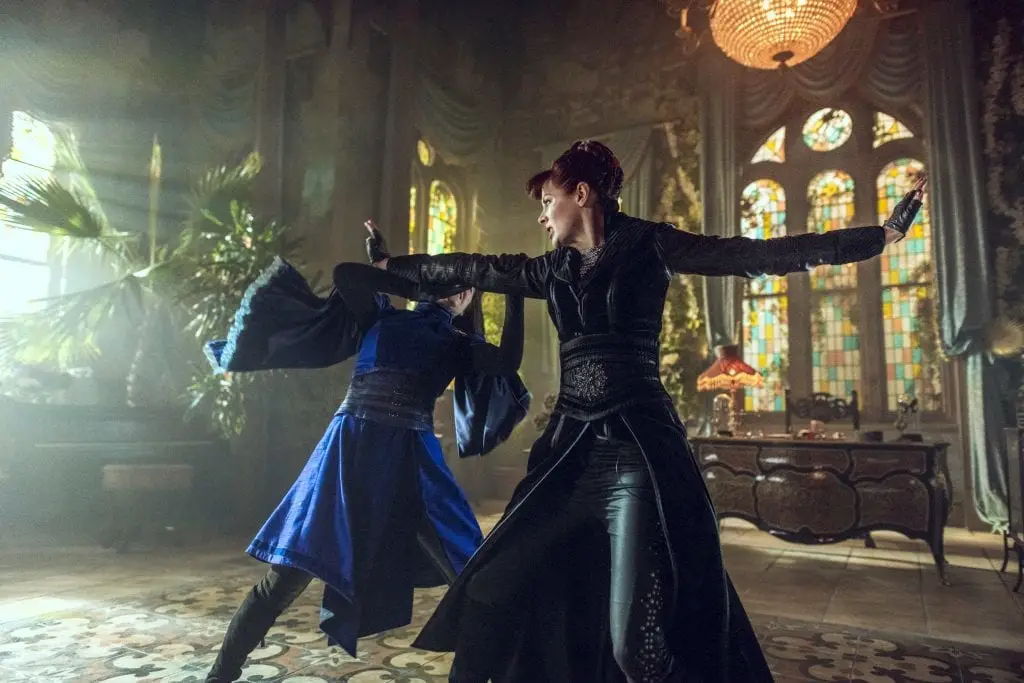
One could argue the Widow’s choice was for the greater good; she clearly believes so. Yet, I’m hard pressed to not see that the show was intentionally drawing a contrast between these two women. Tilda’s reactions to the Widow evince a breakdown in idealization and a rejection of her as a ‘true’ mother figure; her refusal to call the Widow ‘mother’ after the latter hands over Veil to Quinn says as much. The contrast between the Widow and Veil underscores the theme that, for Into the Badlands, ‘true’ motherhood is self-sacrifice, selflessness, and putting the needs of your child above everyone else’s, even your own.
And that brings me to…
Doylist Implications: Idealized Motherhood, Fridging, and Manpain
Um, so yeah, idealized motherhood is a problem for both of these characters. On Into the Badlands, ‘true’ mothers put their children first and willingly sacrifice themselves for their sake. Veil epitomizes this value, but we see it in Lydia’s life as well.
Quinn’s first wife and the mother to their son Ryder, Lydia puts her own physical and emotional safety at risk to protect and advance Ryder’s interest, even when they clash with her husband’s. In fact, so committed is she to her son that Ryder’s death sets her on a path of revenge against Quinn, who killed Ryder after he usurped Quinn’s barony. She eventually re-aligns with Quinn and assists in Veil’s forced marriage because Lydia still loves him for…reasons, but the point remains that up until Ryder’s death, she consistently chose her son over her husband.
Bear in mind that on the show, Veil and Lydia are the only two main female characters who have biological children. I know three’s a pattern, but we only have two characters to go on for Into the Badlands, and they both fall neatly into the same box: good mothers are selfless and sacrificial.
Thus, the Widow’s position as a mother figure, though without biological children, stands out all the more strongly. Veil’s sacrifice ensures that her child will be loved, protected, and perceive her as a martyr. The Widow’s lack of sacrifice led to the betrayal and disillusionment of her child-figure Tilda. In fact, the Widow almost kills her own ‘child’ to protect herself and her ideals rather than admit she was wrong and seek reconciliation. She is a fallen mother where Veil is an exalted one.
The Widow is neither selfless nor sacrificial. She may kill for her metaphorical children, but she will not die for them. I don’t know if it’s intentional or not, but the idea seems to be that the Widow fails as a ‘mother’ because she doesn’t know what ‘real’ (i.e., biological) motherhood is. She cannot be a real, idealized mother-figure because she doesn’t have ‘real’ children, only conceptual ones. And that’s just all kinds of fucked up.
Eleanor fits the idealized motherhood trope, though to a significantly lesser degree and without the messy contrast with a less ideal mother-figure to prop her up. Her idealization comes in the form of her willingness to sacrifice herself for Madi and desire to settle down into being no more than a housewife and mother. In fact, it seems less a matter of idealized motherhood on purpose, as Veil’s story seems to be, than it is by accident due to a cluster of narrative choices.
Eleanor attempts to rescue Madi and dies in the process. It’s a noble sacrifice, for sure, but it wasn’t made because of her motherhood or to protect her child, as Veil’s decision was. Her desire to settle down with the man she loved was both meaningful character growth and part of the ideological struggle of the season between a quiet life of love or fighting against the system. Her death was random and contrived rather the pinnacle of motherly sacrifice for the good of her baby.
At the same time, the only reason she chose love over civilizing Nassau was, you guessed it, because she found out she was pregnant. She’s thus an idealized mother by implication. Stemming from her pregnancy, the choice to set aside political ambition and ‘settle down’ with her husband and unborn child places her firmly within the expected gender norms for women and motherhood. A ‘good mother’ puts her child’s needs first. Since Nassau isn’t a safe place to raise a child, Eleanor’s desire to leave it all behind looks very much like it’s done not from character growth (though I know it is) but because that’s what a ‘good mom’ would do. A ‘good mom’ chooses her husband and baby’s health and happiness; a ‘good mom’ gives up political ambition, her job, and desire for recognition to take care of her family.

Again, I don’t think this was at all intentional. But honestly, that was my first impression of her story. Only upon reflection did I see the thematic fit and character growth evident in her narrative. As I said above, this narrative choice first struck me as a domestication of Eleanor’s ambition and an attempt to force her into a more conventional role where motherhood became the primary force in her decision-making process.
And it still kind of is. Her pregnancy, and thus motherhood, was her guiding motivation, it just wasn’t the proximate cause of her death as it was for Veil.
It’s also worth pointing out that both characters intersect at least somewhat with manpain and the fridging of female characters. Eleanor’s death, and his discovery of her pregnancy, solidifies Rogers’ descent into revenge and despair. Nevertheless, prior to her death, Rogers was already well on his way there. I mean, a guy who would ally with the Spanish to rape and pillage the town he supposedly wants to control in order to pay off his debts isn’t exactly in the peak of clear-headedness.
Like Billy Bones in S4, Woodes Rogers was a bit broken when the season started (or soon thereafter) and the cracks only worsened as the season went on. While contrived, Eleanor’s death didn’t feel like fridging and mainpain to me. Yes, it increases his desire for revenge against the pirates, and he shows remarkable cruelty toward the end of the season. But remember, this is the man who had Blackbeard keel-hauled not once, but three times, and then petulantly shot him in the head when Blackbeard ruined his Moment™ by refusing to die. Eleanor’s death may have solidified his descent into black guilt and his thirst for revenge, but it didn’t precipitate it
Since it is not the proximate cause of his pain and struggle, I have a difficult time calling it manpain or fridging, at least in the traditional sense. Her death affects her husband, of course, but it isn’t about him. It doesn’t make her any less of a female character who didn’t need to die. Or one whose death wasn’t clearly driven by narrative contrivance. Your mileage may vary, but to me, these subtle differences are enough to avoid some pretty problematic storytelling tropes.
Veil’s death, on the other hand, is very much poised to shift Sunny’s character arc moving forward. Showrunner Al Gough has said as much in an interview with Black Girl Nerds writer Monique Jones,
“I think for Sunny, he was left with [Veil’s] last words, which were [to] teach Henry to be good. I think that goes to his larger journey of how is he going to engage in the world? How is he going to make the world around him better and better for his son…He does have something to live for; it is his connection to her. He was part of the problem in this world, and how is this going to propel him to be part of the solution? He had that connection, he had love, they had a baby. He’s taken life and now he’s created life and what [is he] going to do now as a parent in a very dangerous world?”
While mostly avoiding manpain by not giving us a traditional Revenge™ arc, Veil’s death changes something about Sunny’s character and his perspective on the world. Thankfully, it sounds like it will be in a positive direction, but that doesn’t change the facts. Her death is still the primary and proximate cause for Sunny’s behavior and actions. Moreover, the main narrative affect of her death is to undercut Sunny’s journey this season to find a way back to her and rescue her. As Gough said in that same interview,
“[Into the Badlands is] about a man going on this spiritual and emotional journey to be good. So I think that at a point, Sunny will find his redemption.”
A black woman died so Sunny could have an epiphany about the uselessness of violence. It’s Sunny’s story after all, so even if Gough and the other showrunners wanted her to “go out in a strong way” and “get the final death blow on Quinn, even in this case, if it meant taking herself out as well” (also direct quotes), her death is still about Sunny, not herself. Her death = his character growth. Her death = his tragedy. That’s pretty classic fridging.
More Doylist Implications: Suffering and Dying as a Woman of Color
After Sleepy Hollow, killing off the only primary black female character will look bad no matter how meaningful or thematically significant it was (like the Spring Slaughter did for queer women). As Monique Jones put it in her review of the season 2 finale of Into the Badlands,
“[I]t isn’t right that Veil, like too many Black women characters before her in other shows, was once again the sacrifice for the better good. It’s doubly painful in a show like Into the Badlands, which has been praised for its focus on diversity and inclusive writing.”
Killing off the only black female character in an episode where two white women survive—one of whom literally dug her own grave—doesn’t sit well with me. There are other black women on the show, but Veil was the only primary black female character. She was also the protagonist’s love interest. Her death destroys a rare interracial relationship between a black woman and an Asian man. Given Daniel Wu’s (who plays Sunny) desire finally do justice to the romantic tension in Romeo Must Die, killing off the woman of color love interest seems to be the exact opposite of helpful or desirable. It only perpetuates the notion that interracial relationships of this kind are either disgusting, undesirable, or both.
But the problem isn’t just her death. Think back to what I’ve said about her story this season being about suffering physical and psychological torture while failing to achieve personal agency. On a Watsonian level, she suffers because of her relationship to Sunny. As the mother of his child, she suffers due to Quinn’s mania and increasing obsession with Henry as a viable ‘heir’ to replace Ryder. She also suffers because she’s a skilled healer—the only one skilled enough to destroy Quinn’s tumors—and one who takes her oath to ‘do no harm’ seriously by not killing Quinn at the end of S1 when she had a chance.
But recall that she’s a black woman in a subservient position and Quinn a white man in a position of power. A white man with a very heavily stylized ‘sophisticated’ Southern drawl (the only character with this drawl, mind you). Baron Quinn has, more than any other character, been depicted as embodying the Antebellum South. He has plantations; they’re opium rather than cotton, but even that choice seems symbolic given the visual similarity of an opium bulb to a cotton flower. You couldn’t ask for a better negative caricature of pre-Civil War Southern hospitality and sophistication as a mask for violence, oppression, greed, and lust for power and control. Hell, it’s even filmed in south Louisiana.
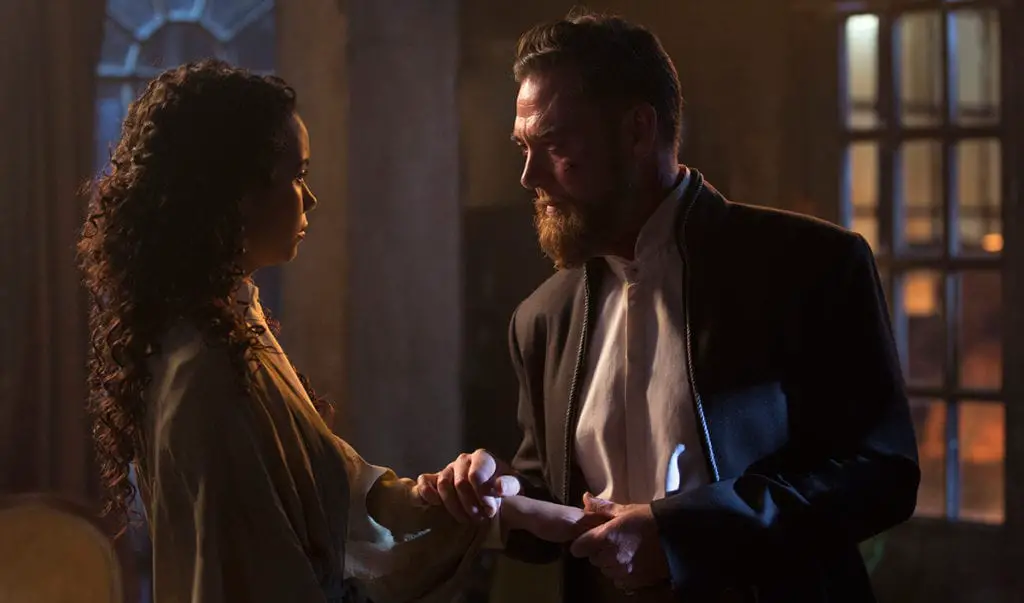
And then the show used him as a vehicle of torture and violence for a black woman under his control. A black woman accorded very little agency in her own plot. She’s actively punished by the narrative for attempting to break free. All but one of her assertions of agency fails. Every attempt to gain some measure of freedom and/or control results in yet more suffering. She’s quite literally trapped and unable to assert herself in any meaningful way against a character who simultaneously represents both white male privilege and slavery. A character who develops a creepy obsession with and entitlement toward both her, a black woman, and her baby, also a character of color. And then she dies.
Yeah…no thanks.
All the suffering that leads up to Veil’s death robs it of any storytelling power. She’s a damsel who was never rescued. Rather than a moment of triumph, her sacrifice is the culmination of a season’s worth of suffering at the hands of a white male sexual predator, rapist, and slave owner who manipulated, threatened, and imprisoned her. It’s too much. I couldn’t sit through the marriage scene, much less what followed. I was physically sick watching and had to mute it. For a story supposedly about resistance, even internal resistance, it felt more like psychological torture porn.
This is partly because of how exaggerated Quinn’s vileness and lechery was by the end of the season. Was it his tumor, or just his character? Ultimately, it didn’t matter. The tumor only existed as the plot demanded and to give him visions of his dead son. His Villain Sue-ness also contributed to the feeling of Veil’s suffering being piled on; the show almost seemed to revel in his utter disgustingness even as he beat impossible odds and magically had all the resources he needed no matter what he was up against.
Looking back, given what’s going on now in Charlottesville and the increased threat of white supremacy and violence against people of color, it’s even worse. Granted, the show could not at all have predicted the turn our society would take during it’s hiatus.
Still, even without current events tingeing it, the narrative has it’s issues. A black woman faced repeated physical, mental, and emotional suffering not to mention psychological torture and attempted rape at the hands of an all-powerful white man. His white wife both looked on and enabled it. Although I do think Lydia redeems herself eventually and is also a victim of abuse, it’s still gross. Everything about it smacks of the historical and current exploitation of black women at the hands of white men and enabled by white women. With such a story, it’s hard to escape the unfortunate and likely entirely unintentional takeaway that the suffering of a black woman is for Drama™.
Conclusion: Two Dead Mothers
Thanks to Black Sails and Into the Badlands, we have two dead mothers. Both are, to one degree or another, defined by their motherhood (this season at least) and it’s idealization. Veil’s arc revolved around protecting her child, and her motherhood functioned as part of a thematic foil for the Widow. By contrast, Eleanor’s shift in perspective may stem from the discovery of her pregnancy, but her story was not employed as a foil the way Veil’s was. In fact, only one other character knows of Eleanor’s pregnancy, so while the audience may know she’s driven by it, none of the other characters do. Rogers misunderstands Eleanor’s choices precisely because she hides the fact of her motherhood.
There’s no misunderstanding Veil, or her motives, by either audience or other characters. At one point or another, every other motivation she had this past season—be it revenge against Quinn or devotion to Sunny—takes a backseat to her mothering instinct. In short, Eleanor is a mother, and that fact affects her choices, but Veil is a mother full stop. The only other defining feature to her narrative this season was her suffering, which has implications both for her as a female character and especially as a woman of color.
Eleanor, on the other hand, spent her season making choices, asserting her agency, and affecting the tide of events. Eleanor faced some scary situations and hard choices, but it was hardly the same level of character and narrative abuse that Veil faced. In fact, the extreme duress Veil suffered throughout the season gives it that much more of an emotional impact, though not in a positive way. It’s a deadly kick to the head after a season’s worth of punches to the chest and gut.
Yet the very randomness and contrived nature of Eleanor’s death on a Watsonian level undermines it’s impact. It feels more like a Plot Twist™ for Drama™ than a meaningful culmination to her character arc. That she’s the only main protagonist to die in the final season, and one that had been present from episode one, only makes her death that much more hollow.

At the same time, because she was an actor with the ability to change the narrative, we feel her absence once she’s gone. At every turn we wonder what Eleanor could have done to affect things, soothe things, stir things up. Her death has an emotional impact on other characters, but the greatest impact on the narrative, to my mind at least, is the loss of a player in the political game. And that signals her independence as a character from her role as mother and wife. We feel her loss in the story arc itself not just in how she affects other characters.
Unfortunately, the same cannot be said of Veil. Moving forward, her lasting impact on Into the Badlands will be in Sunny’s emotional state. Yes, Quinn is dead at her hands, but literally anyone else could have accomplished that action to the same effect.
And, while they both die protecting someone, the meaning is different. Veil dies as a Good Mother Sacrificing Her Life For Her Son. Eleanor dies protecting herself, her unborn baby, and, most significantly, her friend/colleague Madi. Both are sacrifices, yes. Both are acts of agency and self-assertion in the face of violent males. But they’re not the same thing.
One is the culmination of an arc, the other a random tragedy that cuts short an arc. One solidifies her True Motherhood as a foil for another female character, the other is an act of solidarity with another female character unrelated to her motherhood. Eleanor isn’t a Good Mother for defending Madi the way Veil is a Good Mother for defending Henry. And, not to put too fine a point on it, Eleanor dies defending a female character while Veil dies protecting two male characters.
It’s also worth noting that Veil dies after spending the entire season trying to reunite with her lover. They get two seconds of happiness before she’s dead. End of season. Eleanor dies still not having reconciled or reunited with her husband after a seeming betrayal. Your mileage may vary on which feels worse to you as a viewer, but I find Veil’s situation more upsetting. Destroying a happy reunion feels worse than a lack of happy resolution at all, perhaps because it veers so close to narrative sadism.
Despite happening on the heels of a shit ton of gore and violent character deaths at the end of S3 and beginning of S4, Eleanor’s death still manages to avoid being grimdark. That may very well be because of it’s suddenness within the narrative and lack of gore. But I also think it’s because it wasn’t the culmination of a season’s worth of psychological torture porn and threats of violence. Veil’s death feels sadistic because she literally can’t win. No matter what she does, she gets smacked down for it. And her one act of agency that accomplishes anything? It’s her self-sacrificial death. That’s not just dark, that’s basically Game of Thrones levels of ‘what is the point of even trying to be a decent human being?’
At the end of the day, neither of these stories are done perfectly. Both either rely on or play into idealized motherhood in troubling ways and both leave a female character dead who could have had a significant role in the story otherwise. Yet Eleanor’s is done with more sensitivity to potentially negative Doylist implications despite a less than stellar execution. Idealized motherhood defines Veil’s character and her choices. Idealized motherhood in Eleanor’s arc is more a side effect of a weak narrative choice (i.e., she could have come to the same conclusion about leaving Nassau without a pregnancy) coupled with an emphasis on actual character growth and the season’s overarching theme.
As a character of color, Veil’s suffering and death have an even greater negative impact than Eleanor’s death. The story of a black woman unable to get out from under the oppressive control and abuse of a white male coded as a representation of the Antebellum south is pretty awful and not at all what I want to see on my screen. Especially when it culminates in her death and the destruction of her loving relationship with an Asian man, a rare piece of interracial representation for not one, but two marginalized communities. Stories matter and the negative implications of this one far outweigh any emotional or thematic resonance the creators wished to convey.
Plus, when start to tease it apart, what does her death even mean? That the most innocent suffer? This trope needs to die, as it’s usually employed to the detriment of women and people of color. In this case, both. Does her death signify the value of Noble Sacrifice™? Again, why must a black woman suffer for the greater good? And why do we need yet on more story of a Good Mother being self-sacrificing while pitting such an act against a Bad Mother who betrays her ‘daughter’ and is unwilling to die for the ones she loves?
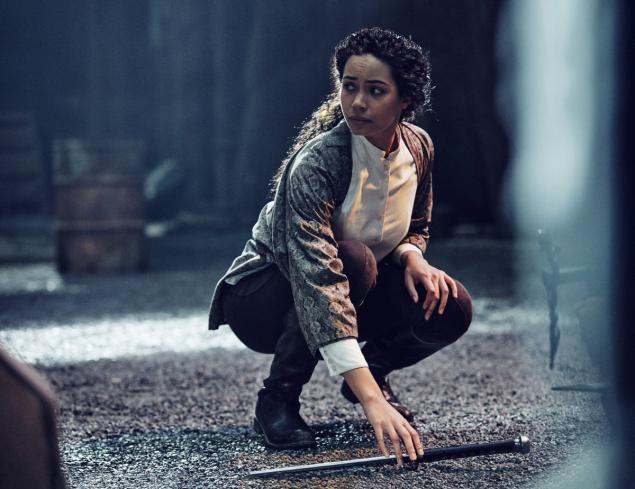
The ultimate message of Veil’s death seems to be that she should have killed Quinn when she had the chance at the end of S1. Is that what she ‘learned’ this season? That sometimes it’s necessary, even good, to kill somebody rather than have compassion? Is that what we’re meant to take away from this? That compassion only leads to suffering, and it’s better to be a killer than a decent person when your world is shit? Yikes. And Veil had to suffer threats of violence, psychological torture, and a forced marriage to and attempted rape by the man who killed her parents to learn it. Double yikes.
Veil’s story is more well motivated and foreshadowed by the narrative, but that’s about all I can say positively about it. One random, nonsensical, and unmotivated act of violence cannot compete with a season’s worth of physical, emotional, and psychological suffering in terms of sheer what-the-fuckery. For, despite Eleanor’s death being entirely someone else’s choice, the way Black Sails told her story clearly affords her more agency and impact on the narrative overall than Into the Badlands did with Veil. Given the choice between a female character whose ability to act in the narrative in a significant way is cut short by one random act of violence and a female character whose one successful act of agency is to kill herself (and the villain) after a season-long arc of getting shat upon, I know which one I would chose.
Oh, and while we’re at it, let’s stop idealizing motherhood and then killing said idealized mothers with an act of noble sacrifice, okay? Let’s stop killing off female characters of color for Drama™ after a season’s worth of brutalization. Let’s start giving female character roles that don’t revolve around either their motherhood or their suffering and violence at the hands of creepy white males. Let’s start giving female characters of color agency in their own stories; let’s start giving them happy endings with the person they love. Finally, let’s create more healthy, beautiful interracial relationships that don’t end in tragedy, something Black Sails actually did.
